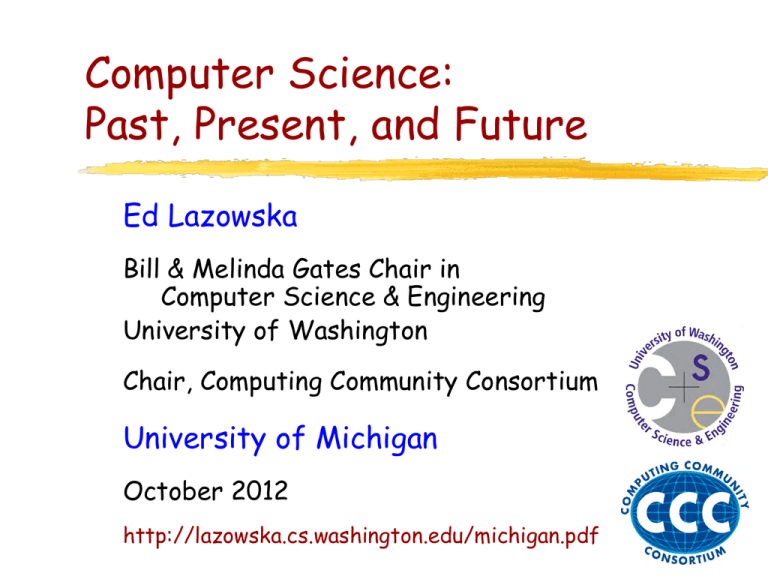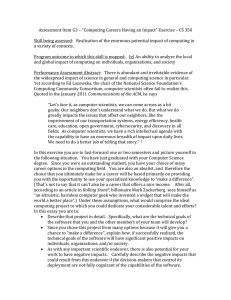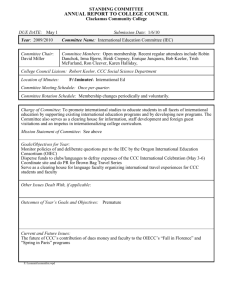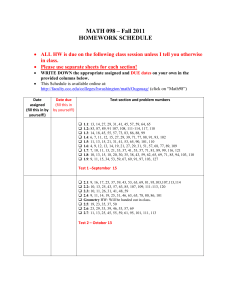Computer Science: Past, Present, and Future
advertisement

Computer Science: Past, Present, and Future Ed Lazowska Bill & Melinda Gates Chair in Computer Science & Engineering University of Washington Chair, Computing Community Consortium University of Michigan October 2012 http://lazowska.cs.washington.edu/michigan.pdf Today … A quick reminder of what we’ve accomplished as a field, and of how we got there The Computing Community Consortium: origins, goals, recent activities The next ten years A few exhortations Forty years ago … Credit: Peter Lee, Microsoft Research With forty years hindsight, which had the greatest impact? Unless you’re big into Tang and Velcro (or sex and drugs), the answer is clear … And so is the reason … EXPONENTIALS US EXPONENTIALS US Mechanical Vannevar Bush’s Differential Analyzer (1931) Babbage’s Difference Engine No. 2 (designed 1847-1849, constructed 1989-2000) [11’x7’, 8000 parts, 5 tons] Vacuum tube electronic ENIAC (constructed 1943-1946) [8.5’ (h) x 3’ (d) x 80’ (linear), 30 tons, 17,468 vacuum tubes, 150 kW of power, 5,000 additions/second] The transistor (1947) William Shockley, Walter Brattain and John Bardeen, Bell Labs The integrated circuit (1958) Jack Kilby, Texas Instruments, and Bob Noyce, Fairchild Semiconductor Corporation Moore’s Law and exponential progress (1965-today) Ditto the Internet 1,000,000,000 100,000,000 Number of hosts 10,000,000 1,000,000 100,000 10,000 1,000 100 10 1 1970 1975 1980 1985 1990 1995 2000 2005 2010 In just the past 20 years (1992-2012), the number of Internet hosts and the number of transistors on a die each have increased 2000x! A connected region – then A connected region – now Ditto software Deep Blue, 1997 Deep Fritz, 2002 Watson, 2011 Ken Jennings, Watson, Brad Rutter Watson, 2011 Bill Cassidy, Watson, Rush Holt The past thirty years … The past thirty years … The past thirty years … The past thirty years … The most recent ten years … Search Scalability Digital media Mobility eCommerce The Cloud Social networking and crowd-sourcing Scalability A decade later … Vastly greater scale The cheapest imaginable components Failures occur all the time You couldn’t afford to prevent or mask them in hardware Software makes it Fault-Tolerant Highly Available Recoverable Consistent Scalable Predictable Secure Digital media Text Audio Images Video Create Edit Consume Mobility Credit: Intel Corporation How did all this come to pass? 1995 2003 2012 Lessons Every $1B market segment bears the clear stamp of Federal research investments There’s nothing linear about the path from research to $1B market segment: ideas and people flow every which way Unanticipated results are often as important as anticipated results The interaction of research ideas multiplies their impact Entirely appropriately, corporate R&D is very heavily tilted towards D: engineering the next release of a product, vs. a 5- 10- or 15-year horizon An Overview of the Computing Community Consortium A standing committee of the Computing Research Association Funded by NSF under a Cooperative Agreement Facilitates the development of a bold, multi-themed vision for computing research – and communicates this vision to stakeholders Led by a broad-based Council Chaired by Ed Lazowska and Susan Graham Staffed by CRA http://cra.org/ccc The CCC Council Leadership Terms ending 6/2013 Ed Lazowska, Univ. Washington (Chair) Susan Graham, UC Berkeley (Vice Chair) Kenneth Hines, Program Associate Andy Bernat, CRA Executive Director Terms ending 6/2015 Liz Bradley, Univ. Colorado Sue Davidson, Univ. Pennsylvania Joe Evans, Univ. Kansas Ran Libeskind-Hadas, Harvey Mudd College Shashi Shekhar, Univ. Minnesota Terms ending 6/2014 Deborah Crawford, Drexel Gregory Hager, Johns Hopkins Anita Jones, Univ. Virginia John Mitchell, Stanford Bob Sproull, Sun Labs Oracle (ret.) Josep Torrellas, Univ. Illinois Randy Bryant, Carnegie Mellon Lance Fortnow, Northwestern -> Georgia Tech Hank Korth, Lehigh Eric Horvitz, Microsoft Research Beth Mynatt, Georgia Tech Fred Schneider, Cornell Margo Seltzer, Harvard Former members Stephanie Forrest, Univ. New Mexico, 2012 Chris Johnson, Univ. Utah, 2012 Frans Kaashoek, MIT, 2012 Robin Murphy, Texas A&M, 2012 Bill Feiereisen, LANL, 2011 Dave Kaeli, Northeastern, 2011 John King, Univ. Michigan, 2011 Dick Karp, UC Berkeley, 2010 Andrew McCallum, Univ. Massachusetts, 2010 Dave Waltz, Columbia, 2010 Greg Andrews, Univ. Arizona, 2009 Peter Lee, Carnegie Mellon, 2009 Karen Sutherland, Augsburg College, 2009 http://cra.org/ccc A Multitude of Activities Community-initiated visioning: Workshops that bring researchers together to discuss “out-of-the-box” ideas Challenges & Visions tracks at conferences Outreach to the White House, Federal funding agencies: Outputs of visioning activities Short reports to inform policy makers Task Forces – Health IT, Sustainability IT, Data Analytics Public relations efforts: Library of Congress symposia Research “Highlight of the Week” CCC Blog [http://cccblog.org/] Nurturing the next generation of leaders: Computing Innovation Fellows Project “Landmark Contributions by Students” Leadership in Science Policy Institute http://cra.org/ccc Example: Robotics 4 meetings during summer 2008 Roadmap published May 2009 Extensive discussions between visioning leaders & agencies OSTP issues directive to all agencies in summer 2010 to include robotics in FY 12 budgets Henrik Chistensen Georgia Tech http://cra.org/ccc National Robotics Initiative announced in summer 2011 Example: Big Data 2008 2008 2010 http://cra.org/ccc 2012 Example: Computer Architecture Josep Torrellas UIUC Mark Oskin Washington Mark Hill Wisconsin http://cra.org/ccc Example: PCAST NITRD Report 1/3 of the PCAST NITRD Working Group members were CCC Council members The report drew extensively on CCC White Papers An excellent roadmap for the field The challenge now: continuing to translate it into action http://cra.org/ccc Example: Leadership in Science Policy Inst. Milt Corn, NIH Henry Kelly, DoE Attendees http://cra.org/ccc Example: NITRD Symposium (2/16/2012) http://cra.org/ccc Example: NITRD Symposium (2/16/2012) http://cra.org/ccc A Community Effort – We Need You! Propose visioning activities, white papers, Challenges & Visions tracks at research conferences Put together short research videos for undergraduates Contribute to the CCC Blog Send us a research highlight for the Highlight of the Week Get involved: khines@cra.org http://cra.org/ccc or http://cccblog.org/ http://cra.org/ccc The next ten years … Simulation -> Communication -> Embodiment My own (consistent) version: In the next ten years, we will put the “smarts” in … Smart homes Smart cars Smart health Smart robots Smart science (confronting the data deluge) Smart crowds and humancomputer systems Smart interaction (virtual and augmented reality) Smart homes Shwetak Patel, University of Washington 2011 MacArthur Fellow Smart cars DARPA Grand Challenge DARPA Urban Challenge Lane departure warning Self-parking Adaptive cruise control Google autonomous car on US 101 near Mountain View CA In 2004, in just the United States: 6,181,000 police-reported traffic accidents 42,636 people killed 2,788,000 people injured 4,281,000 had property damage only ~ $250 billion (that’s one quarter of a trillion dollars …) in annual economic cost 100 times greater than even an extravagant estimate of the nation’s annual investment in computing research But there’s more at stake than safety … Energy and the environment Highway transportation uses 22% of all US energy Efficiency and productivity Traffic congestion in the US is responsible for 3.6 billion vehicle hours of delay annually Equity The elderly, and low-income individuals forced to the exurbs, are disadvantaged The economic and environmental costs of manufacturing automobiles And computing research is central to the solutions Real-time sensor information for transit location Personalized, real-time information for choosing travel options Zipcar on steroids Routing around congestion, for transit and personal vehicles Greater vehicle density through semi-automated control Smart health: Personalized health monitoring Omron pedometer Nike + iPod Biozoom: body fat, hydration, blood oxygen, etc. Bodymedia multi-function Glucowatch: measuring body chemistry Larry Smarr Smart health: Evidence-based medicine Machine learning for clinical care Predictive models Cognitive assistance for physicians Smart health: P4 medicine Smart robots Smart health + smart robots Yoky Matsuoka University of Washington -> Google -> Nest 2007 MacArthur Fellow Tom Daniel University of Washington 1996 MacArthur Fellow Smart science: eScience (data-driven discovery) Jim Gray, Microsoft Research Transforming science (again!) Theory Experiment Observation Theory Experiment Observation Theory Experiment Observation Credit: John Delaney, University of Washington Theory Experiment Observation Computational Science Theory Experiment Observation Computational Science eScience eScience is driven by data more than by cycles Massive volumes of data from sensors and networks of sensors Apache Point telescope, SDSS 80TB of raw image data (80,000,000,000,000 bytes) over a 7 year period Large Synoptic Survey Telescope (LSST) 40TB/day (an SDSS every two days), 100+PB in its 10-year lifetime 400mbps sustained data rate between Chile and NCSA Large Hadron Collider 700MB of data per second, 60TB/day, 20PB/year Illumina HiSeq 2000 Sequencer ~1TB/day Major labs have 25-100 of these machines Regional Scale Nodes of the NSF Ocean Observatories Initiative 1000 km of fiber optic cable on the seafloor, connecting thousands of chemical, physical, and biological sensors The Web 20+ billion web pages x 20KB = 400+TB One computer can read 30-35 MB/sec from disk => 4 months just to read the web Point-of-sale terminals eScience is about the analysis of data The automated or semi-automated extraction of knowledge from massive volumes of data There’s simply too much of it to look at It’s not just a matter of volume Volume Rate Complexity / dimensionality eScience utilizes a spectrum of computer science techniques and technologies Sensors and sensor networks Backbone networks Databases Data mining Machine learning Data visualization Cluster computing at enormous scale (the cloud) eScience is married to the cloud: Scalable computing and storage for everyone Credit: Werner Vogels, Amazon.com Credit: Werner Vogels, Amazon.com eScience will be pervasive Simulation-oriented computational science has been transformational, but it has been a niche As an institution (e.g., a university), you didn’t need to excel in order to be competitive eScience capabilities must be broadly available in any institution If not, the institution will simply cease to be competitive Top scientists across all fields grasp the implications of the looming data tsunami Survey of 125 top investigators “Data, data, data” Flat files and Excel are the most common data management tools Great for Microsoft … lousy for science! Typical science workflow: 2 years ago: 1/2 day/week Now: 1 FTE In 2 years: 10 FTE Need tools! Life on Planet Earth Credit: John Delaney, University of Washington Credit: John Delaney, University of Washington Credit: John Delaney, University of Washington Of course, “big data” is about much more than science Smart crowds and human-computer systems Luis von Ahn, CMU Hours per year, world-wide, spent playing computer solitaire: 9 billion Hours spent building the Panama Canal: 20 million (less than a day of solitaire) Years 1851-1980 were fully digitized, start to finish, in 2009! David Baker, University of Washington Zoran Popovic, University of Washington Regina Dugan Peter Lee Credit: Peter Lee, Microsoft Research Credit: Peter Lee, Microsoft Research 40th Anniversary of the Internet 29 Oct – Announced 5 Dec – Balloons Up $40k Prize 4367 registrants 39 countries 922 submissions 370 correct locations Credit: Peter Lee, Microsoft Research Smart interaction Speech recognition (MSR Redmond) No push-to-talk 4-meter distance, no headset 80db ambient noise Microphone array costs 30 cents VGA camera 4-meter distance Varying ambient light Sibling differentiation Real-time 100% on – deal with compounding errors All body types, all numbers of bodies People are jumping like monkeys Machine learning training utilized massive parallelism Xbox GPU implementation of key functions yielded several-thousand-fold performance gains Identity recognition (MSR Asia) Tracking (MSR Cambridge) System performance (MSR Silicon Valley) All of those “smarts” lead to a particular view of the field CORE CSE mobile natural language processing sensors big data CORE CSE HCI machine learning cloud computing Medicine and Global Health Education Scientific Discovery mobile natural language processing Transportation sensors Neural Engineering Elder Care big data CORE CSE HCI machine learning cloud computing Energy and Sustainability Security and Privacy Technology for Development Interacting with the Physical World Accessibility Credit: Hank Levy, University of Washington Exhortation #1: Embrace “applications” as part of our field! “The last electrical engineer” Exhortation #2: Use both sides of your brain! Exhortation #3: Be a Mythbuster! Dispel these myths! You need to have programmed in high school to pursue computer science in college A computer science degree leads only to a career as a programmer Programming is a solitary activity Employment is in a trough Eventually, all the programming jobs will be overseas Student interest in computer science is in a trough, and is lower than in most other STEM fields Computer science lacks opportunities for making a positive impact on society There’s nothing intellectually challenging in computer science Progress has slowed in computer science Computer science lacks compelling research visions Is this a great time, or what?!?! http://lazowska.cs.washington.edu/michigan.pdf http://www.cra.org/ccc/ http://www.cs.washington.edu/WhyCSE/


